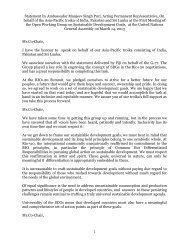STATE OF THE WORLD'S CITIES 2012/2013 Prosperity
STATE OF THE WORLD'S CITIES 2012/2013 Prosperity
STATE OF THE WORLD'S CITIES 2012/2013 Prosperity
Create successful ePaper yourself
Turn your PDF publications into a flip-book with our unique Google optimized e-Paper software.
cities, the business environment is bogged down by the<br />
labyrinth of bureaucracy. For instance, it takes an average<br />
of 119 days and 13 procedures to register a business. 35<br />
Anyone wishing to start a business will require approval<br />
from no less than 12 different government agencies. 36<br />
As one store owner lamented: “You need a document.<br />
But to have that document, you need to hand in seven<br />
documents. And to get each of these seven, there’s a<br />
different demand.” 37<br />
Poorly developed human capital<br />
Education is essential not just for nurturing, but also<br />
for attracting talents, and bolstering innovation. The<br />
development of Boston, Silicon Valley, Oxford and<br />
Cambridge (UK) clearly benefited from the presence of<br />
reputed universities. 39 Availability of highly-skilled human<br />
capital in turn attracts and generates innovative and<br />
knowledge-based industries.<br />
Within the OECD, the productivity of some<br />
metropolitan areas has been attributed to human resource<br />
endowments. For instance in Montreal, the relatively low<br />
productivity of high value-added sectors has been linked to<br />
lower educational attainment and inadequate investment,<br />
particularly in small and medium-sized enterprises. 40<br />
Similarly, in Istanbul and Mexico City, productivity and<br />
hence, prosperity, is hampered by low skills, as well as the<br />
extent of the informal sector, where adult education and<br />
skill upgrading are difficult to provide. 41<br />
Attracting and<br />
cultivating talents has<br />
FACT<br />
The myriad<br />
of laws, taxes<br />
and regulations and<br />
bureaucracy involved in<br />
registering or running<br />
a business has been<br />
cited as one of the<br />
main reasons why<br />
40 per cent of Brazilian<br />
startup businesses<br />
hardly survive for more<br />
than two years. The<br />
cost of bureaucracy<br />
is staggering; in 2010<br />
bureaucracy cost the<br />
Brazilian economy<br />
46.3 billion reals. 38 This<br />
has implications for the<br />
prosperity of cities in<br />
Brazil.<br />
become common practice<br />
for cities in the pursuit<br />
of prosperity. From New<br />
York, to Boston, London<br />
to Vienna, Dubai to<br />
Singapore, or Bangalore to<br />
Shenzhen, many cities can<br />
illustrate this phenomenon.<br />
Munich’s experience with<br />
vocational education can<br />
be particularly inspiring.<br />
The capital of Bavaria<br />
as well as the economic,<br />
cultural, technological and<br />
transportation centre of<br />
South Germany, Munich<br />
is one of Europe’s most<br />
prosperous cities. It ranked<br />
101<br />
FACT<br />
From Comparative Advantage to Urban <strong>Prosperity</strong><br />
Just as a favourable business environment enhances the<br />
prosperity of urban areas, the high cost of doing business<br />
can serve as an impediment to cities becoming more prosperous.<br />
A high cost of doing business has obvious implications for<br />
investment, productivity, employment, income, taxation and<br />
poverty reduction – all of which impact on the prosperity of cities.<br />
8th for technological<br />
innovation (as measured<br />
by international patent<br />
applications), among<br />
the 500 sample cities in<br />
the 2010 Global Urban<br />
Competitiveness Ranking;<br />
its GDP per capita was<br />
USD 58,197 in 2007 with<br />
three per cent economic<br />
growth on an annual<br />
average basis in 2001-2007. 42 Low levels of<br />
POLICy human capital<br />
or labour can hinder urban<br />
prosperity. When it fails to<br />
develop and nurture human<br />
resources, a city will be less<br />
likely to be prosperous than<br />
those with highly educated<br />
labour forces.<br />
Munich’s manufactured<br />
products enjoy a good international reputation and export<br />
competitiveness. The city’s large proportion of high-skilled<br />
workers, nurtured through its vocational education system,<br />
has been crucial to the city’s prosperity.<br />
High crime rates<br />
Crime is a major deterrent to domestic and foreign<br />
investment and can cause capital flight. In Africa, more<br />
than 29 per cent of business people report that crime was<br />
a significant investment constraint. 43 Investors generally<br />
worry about violent crime for fear of direct losses to<br />
business and lack of security for staff.<br />
High crime rates can have a crippling effect on the<br />
prosperity of cities. In Lusaka, for instance, fear of crime in<br />
the poverty-stricken community of Chawama can prevent<br />
teachers from showing up<br />
at work. 45 In South Africa,<br />
a survey of major cities<br />
showed that over a quarter<br />
of respondents would not<br />
consider opening a business<br />
due to fear of crime, with<br />
more than 25 per cent<br />
saying they were reluctant<br />
to allow their children to<br />
walk to school, while 30 per<br />
cent stopped using public<br />
transportation. 46 In large<br />
FACT<br />
According to the<br />
local experts<br />
surveyed by UN-Habitat,<br />
crime emerges as another<br />
major impediment to the<br />
prosperity of cities. No<br />
city can claim to be truly<br />
prosperous if it is crimeridden<br />
and the population<br />
lives in a perpetual state of<br />
insecurity.



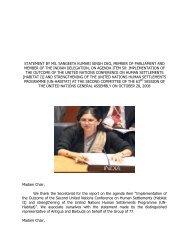
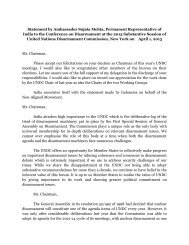


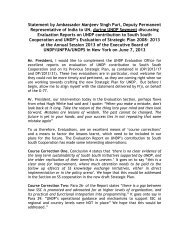



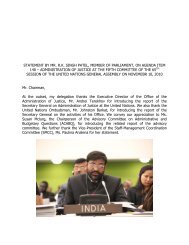
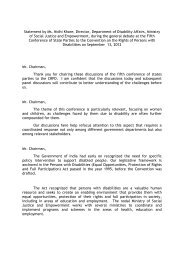
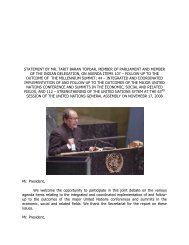

![1 statement by dr.[mrs] kakoli ghosh dastidar - Member States Portal](https://img.yumpu.com/27526598/1/190x245/1-statement-by-drmrs-kakoli-ghosh-dastidar-member-states-portal.jpg?quality=85)
